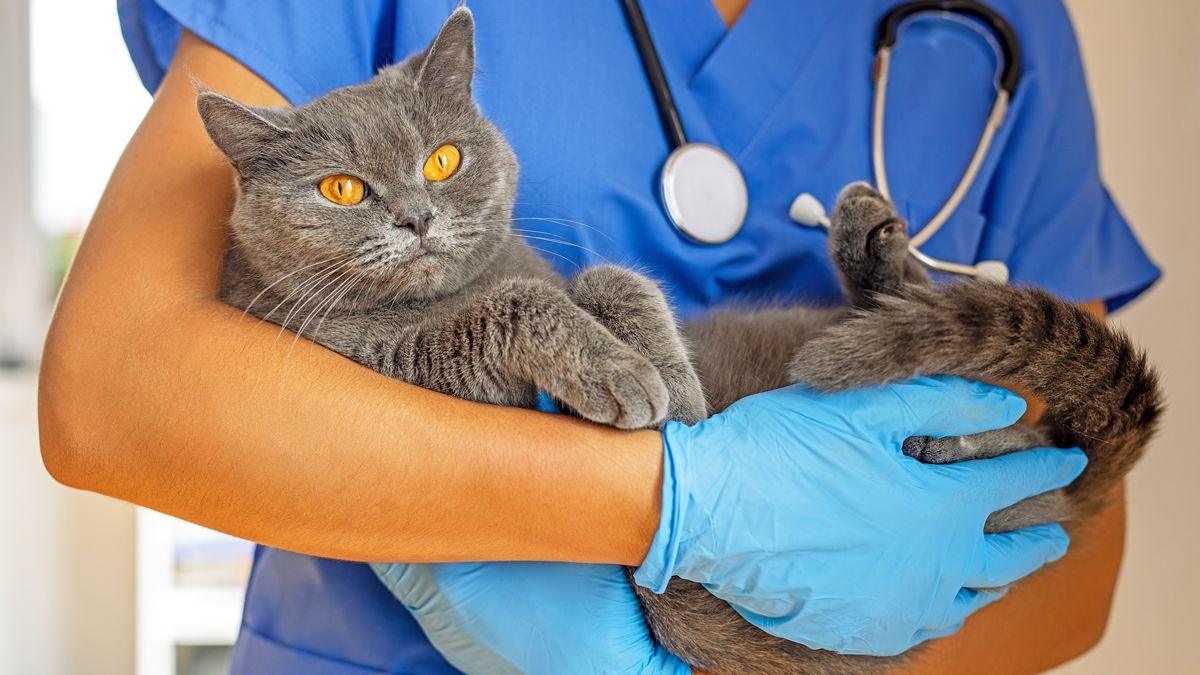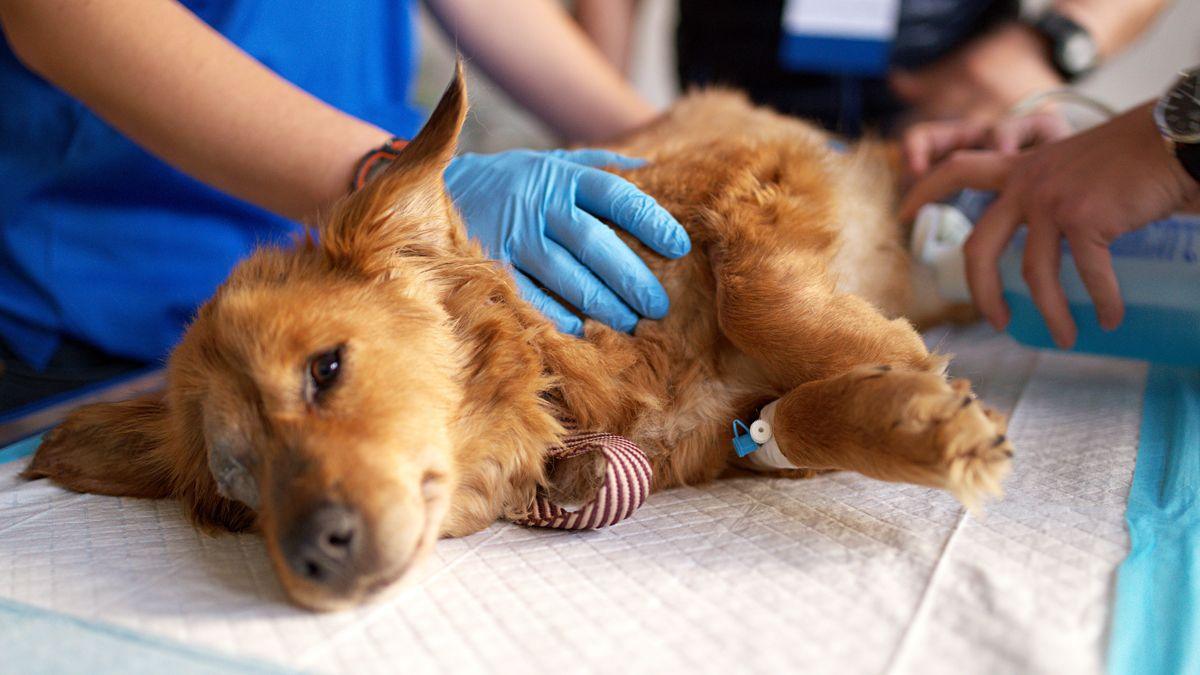Vets say they are under pressure to bring in more money per pet

Vet company IVC told us animal health and welfare was always its first priority
- Published
Some vets are being put under "consistent pressure" to generate income, the BBC has been told.
"Your worth is only how much income you bring," says "Adam" - a vet at a practice owned by IVC Evidensia (IVC), one of the big six pet-care providers in the UK.
He says the amount of money he brings in is one of his key performance indicators.
The BBC spoke to seven vets working for IVC, which owns more than 900 surgeries, who all say they are monitored and set targets by the company.
The vets, who wanted to remain anonymous, had responded to a recent survey by the British Veterinary Union (BVU) - the findings of which have been shared exclusively with File on 4 Investigates.
Adam says he and his colleagues are being encouraged to compete against other practices owned by IVC over the number of certain procedures they carry out on animals, through what the company calls "clinical challenge milestones".
IVC told us the health and welfare of animals is always its first priority and that the best interests of pets are of paramount importance.
It says that clinical autonomy is a core tenet of its business and that all the 8,000 vets and vet nurses working for the company have clinical freedom to recommend appropriate care, considering each animal's needs and the owner's circumstances.
'I felt chastised for not bringing in enough'
In 2013, only 10% of vet practices in the UK were owned by large corporate groups. Now that figure stands at 60%.
Bills for pet owners have risen as corporate ownership has increased - by more than 60% between 2015 and 2023, figures from the Competition and Markets Authority (CMA) show. This is almost double the rate of inflation or the increase in vet salaries over that time.
The CMA is currently investigating concerns about corporations buying hundreds of independent vet practices, pushing up prices and making potentially excessive profits. It is expected to deliver provisional recommendations in July.
Technological advances and changing expectations of pet owners may also be factors in rising vet bills.
All the big six monitor the average amount per animal a vet generates across all their consultations.
In emails seen by the BBC, Adam is asked to explain why his "average transaction value" is "very low" and his use of a certain procedure is also "very low".
"The income is the thing by which you are monitored," Adam says. "You start thinking about how much you charge [per consultation]... what you can add."
Pressure from IVC has resulted in him feeling he needed to upsell to pet owners, he tells us.
"I felt chastised for not bringing [in] enough money."
A graph charts how your practice compares to your area and the whole of IVC, Adam says. "Seeing this is already intimidating if you are below the line."
The BBC has seen emails from IVC to Adam's practice urging vets to carry out a certain number of specific procedures on pets. There are gold, silver and bronze target "milestones" to aim for.
Staff are told about drop-in sessions where they can share what IVC describes as "tips and tricks" with colleagues on how to reach their targets and are told they'll get constant updates on their progress.
What’s Happening to Your Vet Bills?
File on 4 Investigates looks at how the corporatisation of the vet industry has led to price hikes of more than 60% in the last 10 years.
IVC has stressed these "clinical challenge" targets aren't financial but are designed to improve the clinical care of pets. The selected procedures, it says, are all carefully chosen because they are essential to ensuring a prompt diagnosis and stabilisation of emergency patients.
These procedures help identify potential future issues, it adds, enabling preventative action to be taken - which improves patient outcomes, shortens treatment plans, and are therefore more cost effective overall.
The company says challenges were also introduced to ensure care-level consistency across all its practices.
IVC - which is owned by a private equity firm - also owns the UK's largest emergency out-of-hours service, called Vets Now.
A vet who works there, says she and her colleagues have been given similar targets, and offered prizes for hitting them. She claims the company's approach sometimes interferes in clinical decisions and makes it harder for vets to propose treatments based on pet owners' budgets.
Another vet working for the out-of-hours service told the BBC its call centre regularly booked emergency appointments with her for animals with non-urgent symptoms, costing pet owners more than £300.
"I'd say 30% to 50% of cases could wait to be seen in the morning," says the vet.
The call centre, based in Scotland, is staffed by non-clinical call handlers. Guidance for the handlers, seen by BBC, states they should re-offer emergency appointments if callers appear "hesitant", and only offer to put them through to a veterinary nurse or clinic for clinical advice if they "insist".

As well as owning vet practices and Vets Now, IVC has 24 referral centres handling complex cases
A reporter for BBC File on 4 Investigates - pretending that her dog had vomited once or twice - called Vets Now and the two other out-of-hours veterinary services operated by large corporate groups, plus one independent service.
Of these, only Vets Now offered an emergency face-to-face appointment to the reporter, with the call handler recommending the dog should be checked in a clinic. The following day, the reporter called back to check the price. She was offered an online consultation after again hesitating about the in-person appointment.
The other two corporate services and the independent asked our reporter further questions about her dog and advised she didn't need to go to a surgery.
Two veterinary surgeons confirmed to the BBC that a dog vomiting once or twice, with no other worrying symptoms, should not be seen as an emergency.
IVC told the BBC that where there is any reasonable doubt about the severity of a pet's condition, seeing it out of hours is the safest way to ensure its welfare. But it says this is ultimately for the customer to decide, which was made clear during the call.
One of the Vets Now vets also told us that non-urgent appointments were hampering her ability to treat genuine emergencies.
"We are sometimes overstretched as a result of the sheer number of non-urgent cases," she says.
'There is pressure being applied'
As well as owning vet practices and Vets Now, IVC has 24 referral centres handling cases too complex for High Street vets - plus 65 veterinary hospitals, diagnostic laboratories, pet crematoriums and an online pharmacy.
A specialist vet working in one of the referral centres told us he had recently been instructed to give price estimates only for the first 24 hours of a poorly pet's care, rather than more realistic long-term estimates.
He believes this approach is dishonest and feels that it provides people "with a lower upfront cost to get them in the door, to then tell them that, 'actually, it's going to be this much more'".
The vet says that, so far, the referral centre has refused to comply, "but there is pressure being applied".
IVC denies it pressures vets to withhold pricing information. Giving an estimate that exceeds the first 24-hour period is likely to be inaccurate and misleading, it says, given the number of factors that can impact required care.
For in-patient care, it says, its vets will initially provide a range and then give daily updates on costs. This improves transparency and accuracy, it adds, enabling customers to make informed decisions.
A survey of 275 veterinary staff, carried out by the British Veterinary Union (BVU) for the CMA last year, and now shared exclusively with File on 4 Investigates, indicated that monitoring and targets had an impact on the decisions of almost 40% of nurses and just over 17% of vets.
The BVU says the sector has become more profit-driven since non-vets were allowed to take over practices in 1999.
One of the vets we spoke to says he believes IVC's main goal is making money for the venture capitalists behind the company.
Update 16 April 2025: After this article was published IVC Evidensia provided a further response to some of the issues raised.
In relation to concerns about vets being monitored on the amount of money they bring in per client, the company told us: "IVC Evidensia never pressures our vets or vet nurses to prioritise revenue, or average transaction value, over appropriate contextualised clinical care."
In relation to costs estimates, the company told us its vets and vet nurses "comply with the Code of Professional Conduct set out by the Royal College of Veterinary Surgeons in all things, including on providing estimates for the first 24 hours of emergency or complex care, and daily estimates for each subsequent 24 hour period".

Get in touch
Are you a vet or a pet owner? Tell us about your experience.

Get our flagship newsletter with all the headlines you need to start the day. Sign up here.